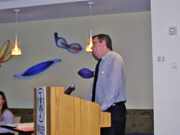New Jersey Transit officials were in Hoboken on Wednesday for one of 16 public hearings to pitch their plan to raise bus and train fares an average of 15 percent in order to fill a major budget shortfall.
A final vote on the fare hike could take place as soon as mid-April.
The worse news is that a sizable fare hike won’t fill the Transit operating deficit in future years, so unless there are some majors changes in how it’s funded, the agency could continue to be in this same predicament each year.
What does all this mean for riders?
It is likely that NJ Transit’s 375,000 daily rail and bus customers will end up paying more for their ride.
Under the NJ Transit plan, fares would increase an average of 13.3 percent on most bus routes and rail lines. But several exceptions would generate larger increases for some rail riders. For instance:
The discount for off-peak trains would be cut in half, to 12.5 percent. As a result, off-peak train tickets would go up roughly 30 percent.
* The fee for changing destinations – deciding, for example, to go on to Manhattan with a ticket to Newark – would become a flat fee of $3.10. Currently, it costs $2.75 to continue on to New York with a Newark ticket.
* The fares for northernmost stations on the Bergen/Main lines would rise an extra 5 percent. Those fares had been kept lower through payments Metro North was making to NJ Transit so that northern New Jersey riders wouldn’t cross the border to catch trains in New York. But the payments ended two years ago when Metro North fares climbed higher than those charged by NJ Transit.
* Under the fare policy, there will be no increase for monthly ticket buyers on the Newark subway, light rail lines and buses for trips within New Jersey
Why the need?
According to New Jersey Transit Executive Director George Warrington, the fare increase is necessary to close a projected budget gap of about $60 million.
According to Warrington, one reason for the need for more funding is an increase in service. According to NJ Transit’s numbers, its $1.42 billion budget includes $40 million for new service expenses, which includes improvements at Secaucus Junction, River LINE, Hudson-Bergen Light Rail extensions, and the opening of the Montclair Connection; as well as the addition of more than 100 weekend and 83 new trains on an average weekday.
Another contributing factor is the rising fuel costs. According to Transit officials, fuel costs are expected to be 46 percent higher in 2006, which works out to about $15 million in extra costs.
Also, the costs of securing and policing the rails and terminals have greatly increased, said Warrington. Since Sept. 11, security expenses have grown by $13 million annually, and the Transit police budget has grown from $15 million to over $28 million.
The state, which finds itself with its own budget deficit, does not, at this point, plan to increase its annual assistance for NJ Transit. In the fiscal year 2005 budget, the state gave Transit $278.7 million.
But even thought Transit is in a hole, Warrington said the agency is doing what it can to control costs.
He added that about 90 percent of the proposed budget for 2006 will go directly to service delivery, with only 10 percent for administrative support for the operations.
“We’ve cut $50 million of expenses over the last couple of years, and we are working hard to identify more efficiencies,” Warrington said.
A rail burden
Although Wednesday’ meeting in Hoboken was sparsely attended, there were still several speakers who came out to complain.
Hudson County Freeholder William O’Dea said that urban areas such as Hudson County that are dependent on train and bus service will be hit hardest.
“A large portion of our residents are low- and middle-income families on fixed budgets,” said O’Dea. “They can ill afford to pay this large of a fare hike.”
Damien Newton of the advocacy group Tri-State Transportation Campaign said as it costs more to ride trains and buses, more people will drive cars, which adds to congestion, air pollution, and road wear.
“A fare hike is essentially a tax hike targeted at those who use transit,” Newton. “New Jersey needs to realize that everyone benefits each time someone chooses transit, and not punish those who are doing the right thing by raising the already high rates.”
He suggested that state government dedicate a tax source for New Jersey Transit. He said NJ Transit is the largest transit system in the country without a tax dedicated to help fund its operating expenses.
But there’s more
In his remarks to the press, Warrington said that this one-time fare increase is not the final solution to Transit’s financial woes.
He said that deficit has been “artificially masked” since 1990 with more than $2 billion of capital that has been transferred to the operating budget. The FY06 budget assumes the capital to operating transfer remains capped at $356 million.
“The sound policy decision not to increase the capital to operating transfer means that we’re exposing the structural operating funding gap inherent to all transit systems,” Warrington said. “In New Jersey, every dollar of expense is only covered by about 40 cents in passenger revenue, which leaves 60 cents that must be funded.” He said that as NJ Transit goes forward, there might be the need to look at some combination of reasonable, “periodic fare increases and an adequate level of public assistance.”
